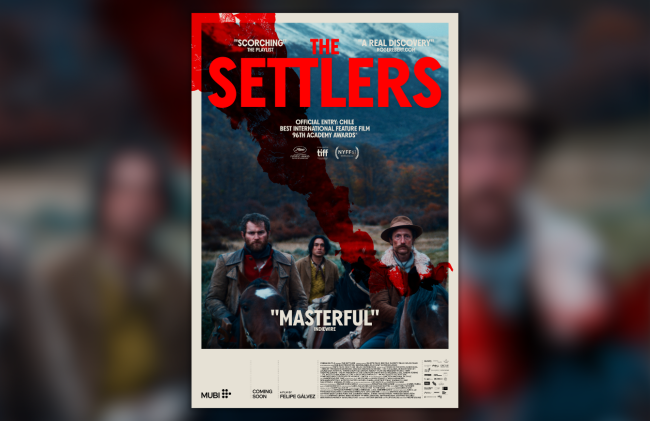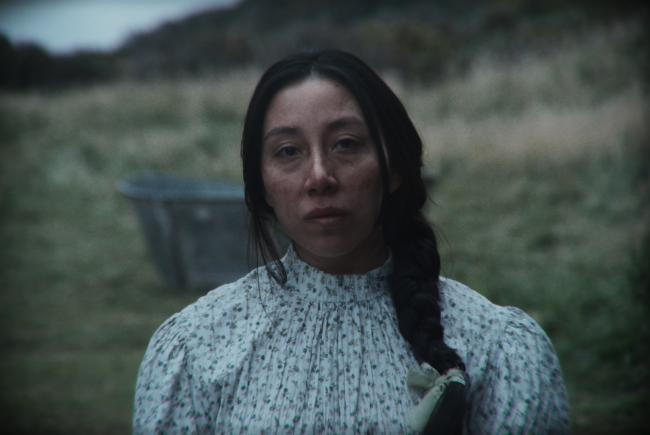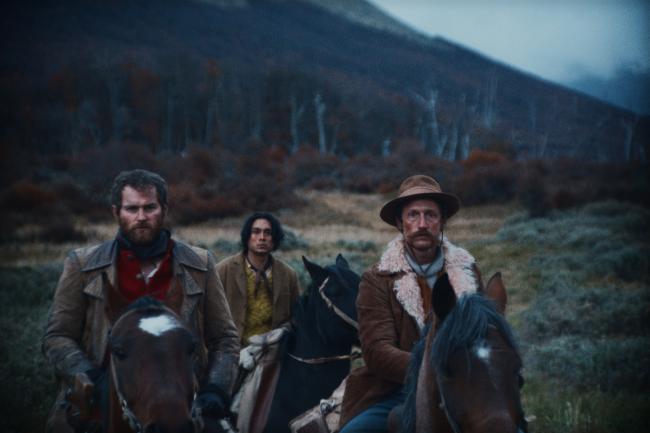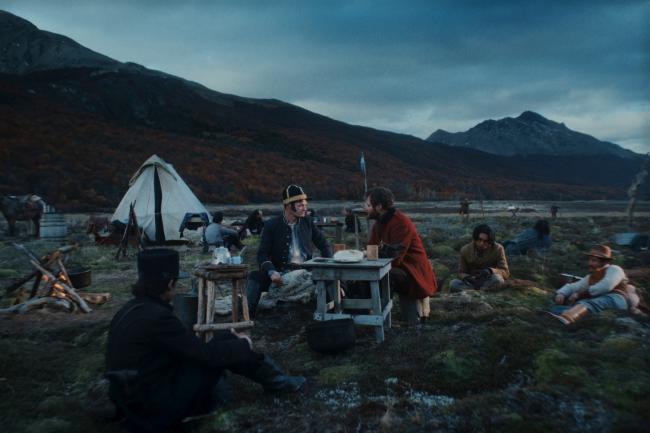
At the southernmost tip of Earth, in the deepest Patagonian wilderness, Scottish lieutenant Alexander MacLennan (Mark Stanley) and his men navigate the vast unhospitable landscape at the behest of wealthy Spanish landowner José Menéndez (Alfredo Castro). It’s 1893 and the reformist Chilean state is imposing its authority thousands of miles away from the modernized capital, Santiago de Chile. Governmental policy—to roll out agricultural development across the nation and stimulate the development of its furthest territories—has prompted a mass giveaway of land to Europeans willing to emigrate and bring their skills to the country.
Los Colonos, or The Settlers in English, directed by Felipe Gálvez Haberle, tells the story of the sociopolitical conflicts that emerged in Patagonia during the mid-1850s as European settlers began arriving in large numbers. A small crew, led by Lieutenant MacLennan (Stanley) and Texan rancher Bill (Benjamin Westfall), who can “smell a Native a mile away,” has been hired to delineate a route for the livestock on the land gifted to Menéndez by the Chilean government. This seemingly simple task is met with fierce resistance by the land’s original inhabitants, the Selk’nam people. The men soon realize what is truly at stake and what the mission will involve.
MacLennan, an ambitious man hired for his military experience, needs a sharpshooter fast enough to react to the ambushes hampering his work. Segundo (Camilo Arancibia), a mestizo local that has been captured and forced to work for the men, has all the skills MacLennan is looking for: an ability to communicate with the Indigenous locals and superb gun capabilities. After a selection process in which Segundo’s outstanding marksman skills outshines the other candidates, MacLennan orders Segundo to join him and ranger Bill on their assignment for Menéndez. They force Segundo into betraying his own people and assist in the repartition of his own ancestral land, a task that leads him to wrestle with his own conscious when forced to carry out the most heinous acts of violence.


Los Colonos, which won a 10-minute standing ovation during its world premiere at the Cannes Film Fesitval, manages not only to depict the brutality of the Selk’nam genocide that took place in the early 1900s as colonists arrived in droves, but articulately describe the context in which it took place. Colonists sought to remove the “primitive natives” from the region and install European culture in the emergent republic.
The film features a noteworthy performance by Chilean heavyweight actor Alfredo Castro (Tony Manero, Postmortem, No, The Club, Neruda, My Tender Matador, and El Conde among other films) who deftly interprets the role of the grandiose Spanish landowner, convinced of his superiority over the “savage" original inhabitants of confiscated lands. His commitment to the civilization of the area is made evident when he is challenged on the treatment of the Selk’nam. The gentry in Santiago relies on people like him, pioneers willing to get their hands dirty, he glibly reminds a government official. MacLennan, played by British Actor Mark Stanley (Game of Thrones), compellingly conveys the modus operandi of the ambitious grifter who will stop at nothing in order to achieve status, his ingrained racism and entitlement spurring on his violence until it reaches a gruesome crescendo. Likewise, Camilo Arancibia, a relatively inexperienced emerging actor, manages to convincingly convey the agony of a mestizo caught between the two worlds he resides in.
The violent subjugation of the Selk’nam is central to the plot of the film. They are the last Indigenous tribe thought to have encountered Europeans, and although they still exist todau, their numbers were greatly reduced in the mid 19th to early 20th centuries during the Selk’nam Genocide. What had once been a population of 4,000 was rapidly reduced to just 279. They were initially chased off their land by gold miners and ranchers, but as redevelopment of the region intensified with the arrival of more colonists, the extermination of the Selk’nam reached its peak. Today, just one person is believed to speak the original language of the Selk’nam people. The film’s somber message is all the more poignant in light of the recent collapse of Chile’s recent constitutional project, which promised to finally recognize Indigenous peoples and grant them equal rights and a stake in local and national government.
Los Colonos—director Gálvez's first feature length film—has been widely acclaimed. The film won the FIPRESCI prize at the 76th Cannes Film Festival in 2023 and was chosen to be part of the Un Certain Regard selection for its stunning imagery and stellar performances.
This is a phantasmagorical, bleak, and necessary film that successfully tells the barbarous story of Chile’s colonial past, while relaying the sexual violence and racist ideology that underscore the landgrab across Patagonia. Ultimately, it is a film about unfettered greed and the extermination of a people and culture.

As conflict between states and Indigenous peoples across Latin America continues, the film holds important lessons for contemporary governments. As director Gálvez observes: “Chile has much to resolve in its present because it has been unable to reflect upon it past. As its not interested in its history, problems continue to repeat because it’s a country that does not learn from it past, instead it chooses to erase it constantly.”
The conversation that Los Colonos prompts about Indigenous rights and colonization is far from over. Currently, Indigenous Mapuche territories in Southern Chile are under military occupation at the behest of President Gabriel Boric, who despite his promises to reach a peaceful solution to the so-called Mapuche conflict, has alienated and continued to repress Mapuche communities. In the Araucania region, heavily exploited by destructive forestry companies and salmon farms, scores of Indigenous political prisoners are on hunger strike. Pinochet-era terrorism laws are still routinely employed to criminalize Indigenous land struggles and imprison community and political leaders such as Hector Llaitul, leader of the Coordinadora Arauco-Malleco (CAM), and several other prolific members of the group.
After the collapse of the constitutional project that sought to grant equal rights to Indigenous peoples, relations between the Chilean state and those communities have never been worse. As Chile aggressively expands lithium extraction in the Northern territories, uses violence and incarceration to quash dissent, and declines to take action on the destruction of native forests, lakes, and rivers in the South, its plurinational aspirations appear to be over.
Carole Concha Bell is a PhD candidate at King's College London. She is researching Chilean second-generation diaspora literature and regime discourse at the Spanish, Portuguese and Latin American Department (SPLAS). She is also a regular contributor to national and international media on the subject of Chilean politics and Indigenous rights.

